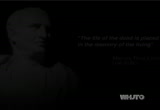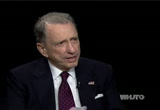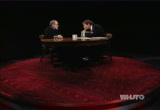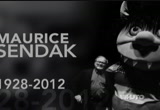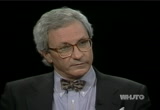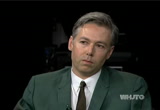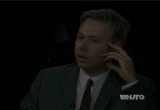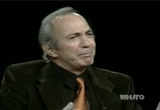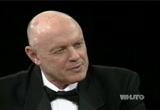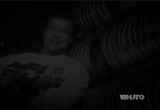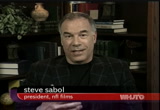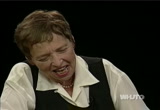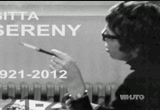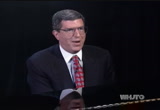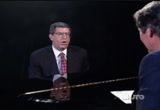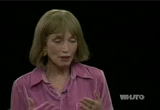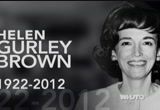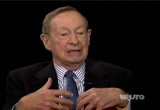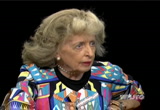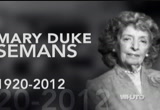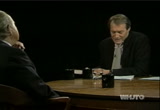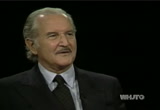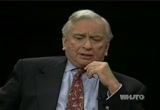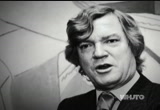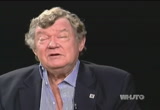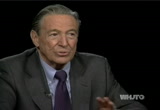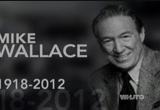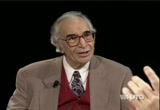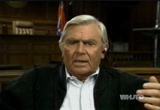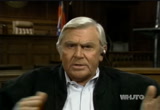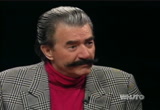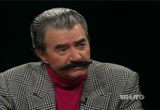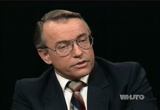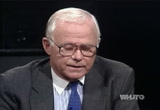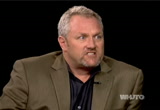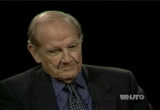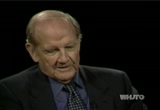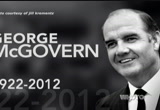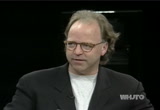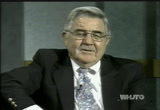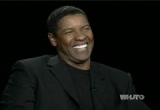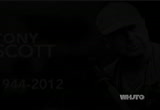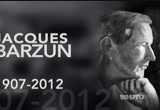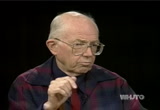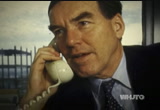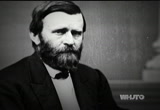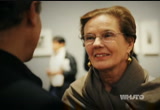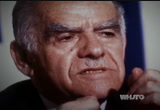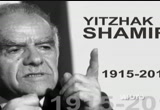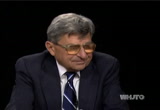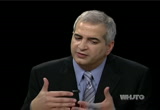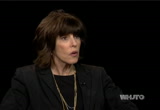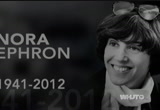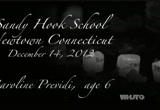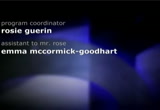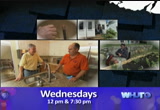tv Charlie Rose WHUT January 2, 2013 10:00am-11:00am EST
10:01 am
10:02 am
>> rose: so better make the best of it right >> that's right. i better -- i better not enjoy it, i better luxuriate in it. it's a great privilege. being a senator is a great privilege, charlie. and it taught me being alive was a great privilege. i write about that.xd i was sort of more open in this book than i'd like to be. sort of let it all hang out. >> rose: what was the hardest thing for you to write about? >> well, the hardest thing to write about is facing my own mortality. the hardest thing to write about is wondering notwithstanding all my bravado and all my assertiveness if i was going to make it. >> rose: do you think you could have handled death? >> i'm not looking forward to the experience but i think i can and from what we know about human existence, it's inevitable. >> rose: (laughs) >> so i will handle it. >> rose: exactly.
10:03 am
>> a coward dies a thousand deaths, a hero one. >> rose: do you have a different vision for what's good for children's reading? authors and prevailing wisdom? >> well, my feeling is you tell the truth as best you can and the people who you treat most are children to create a little ghetto land where you discreetly put in information which is totally useless to children. it bothers me a lot. there's also room for books that are more serious, perhaps, go to another level,. >> rose: more emotional, more demanding. more -- >> yeah, i've been in the business for 40 years and for 40
10:04 am
years i've heard from children and their letters are so fierce. >> rose: fierce in what way? >> well, i mean, they ask you such incredibly personal if -- i wonder why are they asking me. why aren't they asking their parents? the answer simply is they probably cannot ask their parents. >> rose: do you feel inadequate to respond because you don't know the answer? >> i often don't know the answer but you tell them. what's touching is they're asking the question the questions frequently is to do with life and death, sadness and morbidity. happiness, love. >> in the spring and summer of '92 i was editor and i was watching the campaign develop. i covered it for the "new york times" before and political
10:05 am
campaigns in season and i noticed something things i hadn't seen before. first paul tsongas started talking about gay issues then bill clinton appeared at the palace theater in may of '92 before a gay audience, before television cameras and national political reporters and made some very concrete promises to the gay crowd he was the presumive nominee then and somebody whose position hadn't done that before and it seemed to me looking at that and looking at the attitude of the republicans what were hammering on gay and lesbian voters and with pat robertson and pat buchanan from the pulpit of the republican national convention, between those two attitudes, those polarizing rejection and acceptance, a national gay block vote formed for the first time
10:06 am
and that affected the election in a decisive way. >> rose: what did you do? >> i wrote an op-ed piece for the "new york times" saying it had a huge psychological effect and might affect the election and i wrote it and thinking about it the week after i wrote if this is going to happen, why isn't this a book? and if it's a book why shouldn't i try to do it? >> i remember a friend of mine saying why don't you make a rap record you're already making punk records, you're a punk band and i thought that's crazy. even though we kind of rhymed all the time but the idea of doing a record seemed kind of wild. >> rose: so whose idea was beastie boys?
10:07 am
>> well, it was the -- >> rose: was it your idea? >> well, we said let's start a band. >> it was a punk scene in new york. and it was petering out. >> and is this other scene was forming and kind of everybody that was around was sort of forming bands and everybody that was around was probably in like five different bands because they were just like 20 or 30
10:08 am
kids hanging out and beastie boys was kind of like, you know, we should start a punk band. >> rose: how did you get into acting? >> well, there was this boys club across the street from the building and there was a drama booth and i got into a play, heard the applause and i said this is my way off the corner. especially when the coach said "i think you have talent, that's all he had to say. then, of course, the dream started there at the age of 13. >> rose: you're having great time. >> the time of my life. >> rose: can you then look at this career that is at a great moment and say "thank god i did this and didn't do something else"? thank god it's worked for he? >> oh, yeah, sometimes i wake up saying "what if i didn't make it
10:09 am
as an actor? i haven't prepared myself to do anything else. i'd be a bag man under those cord bard sleeping on the streets." as luck would have it i happened to get lucky and make it. >> the question is: are you a product of your nature or nurture? nortsdz, your genes or the way you were raised? i believe those things powerfully influence us, there's no question about it. i think we're a product primarily of our choice to either of those things and to everything else that's happened in our environment. so i put a heavy, heavy focus upon the power of choosing that we are not like animals, that we have an internal awareness of our sell that have enables us to stand apart from ourself. we have our imagination so that we can create something that is not there. we have independent will. we can actually swim upstream.
10:10 am
we have a conscience. we have this kind of inward light or moral sense, this compass of what is right and what is wrong. and i think those four unique human endowments, animals do not possess, that is our common heritage. >> most department stores are very similar. that the merchandise you find in one is rather similar to the other. and it's -- how do you differentiate the bloomingdales from anyone else? well, the element of romance, the element of product development, doing unique things brought people to bloomingdale's brought a worldwide reputation and really helped take the store from the number five store in new york to the unique institution it became. the slogan "like no other store" we coined when we opened in washington because we wanted to separate ourselves from the rest of the retailers.
10:11 am
>> to me, super bowls are not won by big things done well. >> rose: right. >> they're won by little things done poorly. an off side penalty, possible interception that's dropped, a muff punt. because the superbowl to me builds -- there's a psychology that in the very beginning a little pebble falls here, a little pebble fall there is and all of a sudden you've got an avalanche and the game's out of control and it's very difficult in the super bowl to fall behind and get back, get your momentum back and make it a game. so to me as a viewer, i hope the game is close. i hope we can go into half time and still have this game competitive. >> rose: you've seen 42 of these things. >> (laughs) that's right. >> rose: why do you go back every year? >> you know something, when you say that, people always ask me how the game has changed and the thing, charlie, is the game hasn't changed. whoever blocks and tackles and makes the fewest mistakes is
10:12 am
going to win it. what has changed is the public's perception of this game. i've seen it go from a curiosity to a game to an event to an experience and now it's a national holiday. >> rose: have you ever been able to answer finally this question of what makes people evil? >> i think what creates evil is emotion. every single person i have talked to over the last 35 years on this subject -- not on the subject about this but on the subject of evil of one kind of another has been brought to this or has been driven to it as children are by emotion. by love or by the withdrawal of
10:13 am
love. i know this sounds very feminine, you know? and perhaps -- i know all this. and i know this is what many people will say, and we say this isn't serious. but our lives, that is what our lives are. our lives are emotion. and if we don't have emotion we are nothing, you know? if we don't have next to emotion morality, we're also nothing. despair-- i say hit in the book-- through this corruption has suffered because of his love for hitler and hitler's love for him became not immoral nor amoral but morality was extinguished in him.
10:14 am
morality is extinguished, there was no human being left. >> if you go to movies for years forget it, i mean, the ideas of lonely people -- >> rose: it comes down to finding interesting characters that you like that you can identify with this a story? > them and create enough variety in the banality. >> once you get the money together to make a hollywood movie -- >> and with al pacino, his intensity, so many actors today are not great types. i like somebody who is a great lover3 of type who stares at a woman and means it. >> i tell you what i'd like to talk to you about if you don't mind, people talk about the way we were, how do you write a song how does it happen? so i'm going to use this as an example, i think it's a good example. that film started out outside a college. and peopleñr said how do you knw what happens? what happens for me is i start out by deciding what i'mñi not
10:15 am
going to write so i go i'm not going to write a march. ♪ hey, everybody, it's the way we were -- ♪ not going to do it. not going to do a waltz. so i decide i'm going to think about theñi bells of the colleg. that was on the sound track, just bells. know you live with that for three or four days, go to the store, buy ice cream. that becomes slowly but surely this. ♪ ♪ then you go to the laundry, now i start thinking about barbra streisand, the most fantastic voice, and i'm thinking to myself she sings those wonderful long notes. now i'm writing long notes. okay? and i start that process. now i also happençó to know whee -- what the title of this piece is, right? so all i now need is to put in the title ♪ the way we were --
10:16 am
that's how that was written. a song like "one" for "chorus line" probably one of the easiest songs to write because the lyricist hadlp the title. "one." he loved the idea of having all these people in the part and they're all one. michael bennett said to me "i've got to have a song where -- i have to have a beat where you go boom and those hats go on. so i've go home and i already have ♪ one... then that becomes that. ♪ one, singular sensation -- ♪ ♪ ♪ it's like building a picture in your mind and slowly by surely translating it into the language of music. >> rose: tell me about young helen. >> 18 years old, horrible acne, no money, mother not so long ago
10:17 am
widowed and she's depressed a lot and my sister mary at age 19 got polio before the salk vaccine so she's in a wheelchair and we don't have any money or anybody to help and i think, charlie-- we don't know for sure-- i think my i.q. is just fairly average, nothing special, so i had to hit the deck running and get started. nobody could have been less prepossessing or have fewer credentials and it did take a while, didn't it? i started working at 18. didn't get to "cosmo" until i was 43 years old. that's a lot of years in there. that's what "cosmo" is all about, that's our credo, there's something you can doiññ maybe better than others. try to find out what it is. just keep going. get up everyday and do what's there. do the bad stuff first and anybody can do that. i'm such an example of an american success story what can happen to you from nowhere to
10:18 am
somewhere. >> rose: what do you think makes a great money manager? >> well, i think what makes a great money manager is tremendous intensity because every -- there's so many other smart people working so hard, you have someone that's really intense and determined to beat the market and to beat other people and you have to have someone that -- and the other characteristic that helps is luck because the timing of when you start a hedge fund and how you do in the first six months or a year makes a tremendous amount of difference. >> rose: you say this is a business and investment book mask cading as a fable. >> right. >> rose: and the fable is? >> the fable is -- we talked about it earlier. just the original idea of -- in
10:19 am
the human condition there is this tendency that -- just as i can us are, that you want to have wings and you want to fly and you want to be the best and -- >> rose: but what's wrong with that? >> nothing's wrong with it as long as you are -- as you're able to step away and not fly too close to the sun. and some of the great hedge funds managers have stepped away. >> when i was courting my second husband, i lot my first one-- wonderful man-- when he was 34. jim and i-- i just lost him three years ago-- dr. jim? >> that's right. we were married 51 years. but anyway, before we got married he said you know, mary, i don't really think we should
10:20 am
get married until (inaudible) it would make me feel better. >> rose: jim said that? >> and i said "i think you're right." so i met margaret, his new wife, and dad and i was asking him, mother used toñr say never let e sun go down on your anger. and i say never let something like that ruin your life. you've got to make up w your parents. you've got to make up with somebody that you've had problems with. and it was really wonderful. it really brought us together and i had to talk to trustees once and someone came up to me and said this has done something for my family, because there was something like that going on. you musn't ever let something
10:21 am
bitter influence the rest of yourñi life. >> i've always maintained that grandmothers are the best models in the world. if you don't have a good grandmother you're not going to be a good novelist. and they told me about the family origins and the plantations, the german migrant families, the incredible incident that my great grandmother on the stagecoach assaulted by a ban did who sees her rings and asks her for the rings she says "no, they're my wedding rings." and he says "i'll just chop them off" with which he does with a machete. and she was dignified, and said "is there anything more you desire?" all these stories accumulate and you want to write them when you're 15 or 20 or 25 but the story isn't over yet. the story of this woman goes beyond that. so i waited until her 72nd
10:22 am
birthday when she dies and then i could tell the novel. >> rose: is this the mexican -- the answer to the mexican every woman? >> yes. my true grandmothers were very strong mexican women, early widows who had to bring up their children, work and be very tough so it is an homage to them in a great sense. also, you know, writing about mexico you never really give the is male the role of the protagonist. it's obviously about a very macho mexican and this covers the same period of mexican history the 20th century. but the protagonist is not a woman. so the way of looking at the perspective is completely different. totally difference. >> rose: how much influence did your grandmother have on you in terms of the way you looked at women? >> very much. i grew up in the united states. my father was at the mexican
10:23 am
embassy during the newt( deal years but every summer i went to mexico and lived with my two grandmothers and they had a tremendous influence. not only did they tell me stories, they kept alive the english language. i could have been simply an english language reader and writer and i began the spanish language reading and writing. that's what my grandmothers did. >> rose: what you have achieved as a literary figure and a writer is primarily the force of your intellect or the force of your energy? >> well, energy without which there is nothing. so i was genetically very sound. i come from an energetic family. i came from a family that refused ever to to accept a fee. my grandfather was blind at the age of ten.
10:24 am
he wanted to go to the senate, which was an important place in those days. and he got there at the age of 38 being able to read. >> rose: and you would read to him? >> i read to him as a kid, i was brought up in his house. and i never, ever felt sorry for myself because i would think of him. i had two eyes, at least. so i had these examples in front of me of people who had overcome quite a lot. so i was -- that combined with energy. >> rose: what would you do different in the life that you have lived? >> i can't think of anything. i have done pretty much what i wanted to do. i'll give a little of advice out there for those who worry about their place in the world. always remember that it is of no consequence to you what people think of you. it's what you think of them. that's how you live your life.m
10:25 am
>> you sometimes have tears of rapture, sometimes tears of fear. >> rose: you once said that even if you feel you should keep steady at the funeral of your relatives, you should weep. >> that's right. that's right. >> rose: can you define what it is that makes great art for you? >> intensity. intensity and coherence. now, don't ask me what i mean by intensity or by coherence. there is actually some that is right goes directly -- in some sort of way it goes directly to your central nervous system. it gets through all of the habit and all the things that you've seen before. i don't mean that you live in a continuous state of astonishment
10:26 am
but you live in the hope of such a state. i mean, obviously not every work of art does this to you. i can name others, too, many others. but when you hit upon or run into an image which speaks with that degree of directness and that degree-- even if you don't understand the finer points-- you can't say no. you just have to give in to it. >> with good research you can embarrass anybody. make anybody squirm. you could do it to me. but if you are really after illumination, the how an
10:27 am
interviewees character, qualities, substance, texture, if you're really after that you can ask very pointed questions, sensible questions to get them to talk. you can establish-- which you do so well-- a chemistry of confidentiality, what comes across the table which, you dirty dog, you have done on a couple of occasions over the past and you got me saying things i had no intention of saying and -- why? because you're two people who know a little bit about the same subject. if the interviewee has respect for the interviewer and feels that the interviewer knows a good deal and is well prepared you can ask anything and you will find that the interviewee will be a co-conspirator with
10:28 am
you. >> rose: how many days out of a normal year are you on the road? >> i'm trying to cut it down to 18 nights. >> rose: 81 nights. and how old are you? >> 73. almost 74. >> rose: it makes you young? >> i love to play. and getting out on the road, unless i get sick it's the greatest ng the world. if i get sick i still play. (laughs) >> rose: do you play almost every day of your life? >> oh, yeah. >> rose: you do. you hit the keyboard everyday? >> right. except when i'm writing and there's a deadline and a commission. then technique suffers because you're gripping the pencil eight to 12 sometimes in a panic half the night after 12 hours already and then it's not good for european know playing. >> rose: now did you write "take
10:29 am
5" or paul desmond? >> paul desmond. >> rose: "time out?" >> " >> "time out" was my album i. did everything else on the album. "blue rondo" and all of those. >> rose: when people say "brubeck has never been better than take 5" what do you say? >> well, i can say that there's maybe 20 or 30 or 40 other things i like to do well. >> rose: that you like to do well. >> yes. >> rose: matlock on abc. how much did you shape that character? >> my father has a lot to do with this character and a friend of mine, lee greenway, who was a makeup man on the old "griffith" show, has a lot to do with it. and i bring many memories to work with me everyday. and so i have -- i have formed
10:30 am
the character in great part. the mysteries to me are not all that important. i hope that doesn't hurt anybody's feelig the human stories, the humanity, the comedy,ñi that's where i get my fun and my enjoyment. >> rose: how do you explain the success of the griffith show even today? >> a lot of things. one was the writing. we had the best writers in town. aaron rubin and i both wrote, and don knotts wrote a lot of the stuff that we did. and i think one of the -- it was a group effortq situation comedy such as so many of them are today where you depend on jokes. a lot of the shows we did they weren't real comedies but when what comedy we did do was character comedy. so you can see it over and over
10:31 am
and over again because it's not a joke that you've heard once and you don't have to hear it again. when you know barney fife is going to put that one bullet in his gun, it's gonna go off! >> rose: (laughs) >> and you wait for that. >> rose: what it is it about the prize fight that makes it for an artist, for you, so interesting? >> well, the heavyweight championship, i watched the fights and sketch the fights. the heavyweight championship is the thing, it's the real big time. the stakes are the highest ofok any sport. and i think the most remarkable thing is the heavyweight division hast( no limit to the size, the scale of the people. they can go up to 300 pounds if they want to. and you have two men who are contracted to fight, they agree fight, and they both go to
10:32 am
training camps and condition themselves to a point where they feel they're unbeatable, undamageable. then they get there against the man they know is equally well prepared and he comes down the aisle and goes up the stairs with all these handlers and all the introductions and everything and suddenly everybody clears out of there and it's what we all face everyday. everybody faces it. >> rose: it can be over in three minutes or it can no go for 45 minutes. >> it can go for a longñi time. it's very damaging but so is the business world damaging. >> rose: is ali the best you've ever -- is he the most interesting? >> he's the most fantastic creature of all people, all the athletes. >> rose: really? >> he deserves to beñi on top. and now on top of it he's become a sympathetic figure. if.
10:33 am
>> rose: how would you paint him now new as a sympathetic figure? >> i don't know. i don't think i would. >> rose: you want to remember him with his athletic grace? >> i think people at their peak. >> well, we consider at one point simply putting clinton's denial on a big blue blob over his face so nobody would know who he was. in fact, we talked about it all last night, most of today, almost up to airtime and decided against it a couple reasons, one of which was we'd been profiling candidates all week on the cbs news. on tuesday we put the clinton piece on, never mentioned it. never mentioned it because the charges are two years old. they've been investigated by reporters at least as good as i am and they found no substance to it.çó secondly, we forget things. four years ago in 1988 "the star" the same magazine and a bunch of other supermarket
10:34 am
magazines had stories about george bush running around spending time with his mistress. we didn't run that story. most of the network news and most papers didn't run it. why should we run that kind of story which to me is the same thing four years late we are bill clinton? >> we know what works in terms of getting people to change their attitude. two things, one is protection of risk and the other is perception of the socially unacceptable. and all the studies show that. and that trend is happening, we're trying to accelerate it. we're trying to take people out of the system so that don't go into the pipeline and end up being addicts. it's very hard for me to see how you can get people to understand the risk of using cocaine without demonizing addiction-- not the addict. addiction. addiction is a horrible end point.
10:35 am
horrible, what it does. we're beginning to learn, by the way, that it's worse that we thought it was. we're going to find out cocaine is so toxic that it's killing people irreversibly. we didn't know that. as a matter of fact during the carter administration it was thought that it wasn't even addictive. we now know it's not only addictive it is a horror in terms of what it was. that's why i can't abide people who talk about legalization. i think it's an abomination to talk about legalization. so i don't think we're talking -- demonizing the addict. we're demonizing addiction. the country's got learn and if they don't we've got to teach them to care about the addict and understand it's a public health problem and that they have to be helped. we're all in agreement that we need more treatment slots. >> i had never been granted any perspective into what a conservative was other than the media framing the conservative as the other. and when i started to read books
10:36 am
that i was not afforded in my collegiate experience -- i was reading the frankfurt school and cultural marxist under the guise of american studies and that was part of my education as well was why wasn't i reading mark twain? why was i reading antonio gram shi? why was i reading or kipler and mar cue a and all these culturally marxist philosophers and i started to investigate that education and i started to resent that education because i remember when i graduated it was high ho, high ho, i'm off to nihilism i go. i had no skill set whatsoever but an inherent angst at the american experience and the concept of exploiting the have versus have not oppressor/oppressed model. >> i grew up in south dakota at a time of strong republican parents. my father was a wesleyan
10:37 am
methodistxd minister e. and the one thing he and i have in common is that we both supported the st. louis cardinal baseball team. >> rose: because you could hear them on the radio? >> that's right. and i still support them this day. it's the first thing i look at in the paper during the baseball season. but i grew up in a strong republican family. i don't think my parents ever voted for a democrat. >> rose: even f.d.r.? >> even f.d.r. i'll tell you what they taught me. my father listened to all of those fire side chats of f.d.r.'s. he greatly respected roosevelt. and what his parishioners would complain about roosevelt my father would always say "now look, brother smith, the man is doing the best he knows how. let's not knock him too hard." i always thought maybe once he might have sneak add vote in there for f.d.r. >> rose: (laughs) in '32 or '36.
10:38 am
maybe '40. >> whoever was in the white house, whether a democrat or republican, my father would always say "the man is doing the best he knows how. don't knock him too hard." but i think what led me to become a progressive or a liberal or whatever you want to call me is that i saw what the depression did to the people in my state. hardworking farmers that went broke. bankers that went bankrupt. stores that closed. it was a sad time and then i saw franklin roosevelt's strong new deal video make a difference. the c.c.c. camp for young men. they worked progress administration and i just decided that we needed a positive, strong government to
10:39 am
deal with problems like that. >> we should say that the october films are the two fop top winners at the festival and they were both really interesting but, you know, films that are not -- they're going to be obscure to american audiences until it's explained what they are. >> they're not immediately mainstream. >> rose: but we love cannes, don't we? >> we do. it's a great festival. probably the most celebrated all over the world. has a market aspect to it which really lends a real circus atmosphere to the whole thing. it's not a pure film festival as such where there is no market atmosphere, where there's not a lot of wheeling and dealing. there's a lot of wheeling and dealing at cannes. >> rose: it's pure art there or whatever we're talking about. >> it's pure cinema. >> rose: tell me about why this was so good for you? >> well, we are a mid-sized independent. >> rose: october films. >> october films. we started up in '91 in los
10:40 am
angeles and moved here in '92 and we compete against the divisions of the major studios such as miramax and fineline and sony and these are deep pocketed major studios. we are a privately held company an one of the few real true independents left on the american scene. for us this year we have for the first time two films in competition that we owned going into the festival. that was the first for us. and for them to do so well it was great. >> bill friday, you knew charles car result athis early years. tell me about that man on that student body who ran and edited that newspaper. >> well, he was like that generation at that time, charlie. bright, very outspoken, creative always probing, always looking, we didn't always agree but in that process there emerged a
10:41 am
relationship of trust that lasted for 40 years. and i think you saw in charles what you so clearly manifest now and that is in our country today i think we confuse the word "celebrity" and the word "hero." and charles was an authentic american hero and that's why so many people loved him so. he spoke to the best that was in people top the creativeness that was in people and we saw it then. >> rose: when you worked with guys from the last four or five movies, washington, pitt, red ford -- am i missing someone? people of that caliber-- superstars-- how do you handle them. >> yes, i sit down with them, spend time with them and make sure -- normally before you sit down i somehow manage to finagle my way around that. >> would you like know leave the
10:42 am
room for this? (laughter) that way he can tell you the truth. you probably won't be working with me again. >> i have always believe strength in my casting. i try to cast at the guys who are at home in front of the t.v. so i look at fine words, gene hackman as a submarine commander i felt he was the character so i always try to channel my character to the script to who i believe the real guys. so it was robert redford or brad. i always want them to be -- i always try to cast who i believe they really are at home. >> rose: cast them the way they are at home. >> everybody says why did you castern? and there's one thing i try to cast who i believe people really are and secondly it's a gut response. the true response comes from here in the end and that was sucdr a brilliant love storyñi.
10:43 am
>> properly taught and learned and acquired, a liberalfá education awakens and keeps alive the imagination. and by the iml"j.)jñ i don't mean fanciful things, but i mean capacity to see beyond the end of your nose and beyond the object in front of you. to see its implications, its origins, its potential, its danger, its charm. all the things that enable one to navigate in this difficult and complex world with a modicum of wisdom. with calm to be alarmed at every little thing happens and with resources that that in moments of stress after retirement a in
10:44 am
illness and loneliness keep one's soul and body alive. >> i think the most extraordinary thing that's happened as a result of the film is what happened on memorial drive. a local tex tire worker, kathy lamb, came to one of our workshops. we'd been working on this for a long time and we were showing bits and pieces of our work in different workshops and she came she was from said "i never heard about this." and she went and asked her father and he said people fell at my feet. why didn't you tell me? we don't talk about that. so she got the coroner's report, the old newspapers so she designed finely a memorial to the seven who died for the rights of the working man, took it to the city council and got their permission to put it up.
10:45 am
and that was fine, she came over to the screening we were having, a rough cut in greenville, raised the $1500 she needed to build the thing. then the city council changed its mind. they -- we don't know why, but they changed their minds. and thin frank beecham, whose grandfather was the suspect of the mills heard about thisçó. but he showed it to the mayor and the mayor thought he was kidding so he changed his mind. and so labor day he was the first speaker at the dedication of the memorial. it was really an amazing outpouring of people who had wanted for 50 something years to do something about this.
10:46 am
>> who is your favorite general? as a student of war? why? >> because he was -- >> rose: because he's british? >> well, he is british though i might have said ulysses s. grant who is about as american as can be. i think the think about -- i think ulysses seize s. grant was the better general but there's some stylish elements about wellington. he was tremendous sort of bravo, a gentleman, and with a very quick turn of phrase whereas it was grant who was notoriously tongue tied. the longest speech he made during his presidential campaign of 1868 was five words long. >> rose: is that right? >> yes. he hated public speaking. the when he was a commander during the war his dispatch is
10:47 am
for models of brevity. he used to sit at his table in the evening in his tent taking his correspondence from that side, writing the answer, pushing the completed letters off the other side of the table. he'd write 30 or 40 of them during the evening. at the end he'd collect them into a pile and send them off. and they would all be perfect expressions of what he wanted done. >> rose: he was a great general because -- >> of his clarity of mind. >> when i first met guillen -- i'm not french and i'd never read proust and he said you've got to read proust to understand where i come from. so i read proust, i happened to be ill and i read all of proust in about a couple of weeks and it's true that i understand all his family, understand french society reading proust. he is a figure coming from
10:48 am
proust, henri, in a way. >> rose: so to understand proust is to understand him? >> to a certain extent. >> rose: tell me about your relationship with him. how did it begin? >> we met through a mutual friend, a mutual photographer called john middy, who was a "life" photographer. his opening line was "i want to see your contact sheets. (laughs) but it's true that he already had the reputation of judging ago photographer by looking at that contact sheet upside down. >> rose: really. upside down? >> yes, he would say you must look at a picture upside down because you can see the construction, you can see the way the photograph has been composed much better. >> rose: so after he shaw your contact sheets? (laughs) >> we got to know each other a little better. (laughs)xd
10:49 am
>> rose: your proudest achievement in the service of your country is what? >> well, i cannot, you know, make distinction what was more important than less important. >> rose: let me make one guess. >> i would say for instance now if i try to think what i've eve achieved for let us say immigration of huge masses of jewish people. and i think it was that. i have brought all the jewish and european community from ethiopia yah to israel. it was an achievement not of myself only, it was a collective
10:50 am
achievement of the state of israel but i had a part in it and i am proud of it. >> my dad had been the guy that dropped out of high school, joined the army, was fighting pancho via and i went to night school at night, went to law school at night, the whole bit. he wanted me to be a lawyer. so i said well, we owe $2,000, when i get out i'll owe $2,000, so i said let me get a job. so i got a job, my coach at brown was a coach at brown, took the job at penn state, so i went down there with him, i was going to go two years. i got caught up in coaching. i called up and i said dad, i'm gonna coach. you're gonna coach? what did you go to college for? >> rose: (laughs) >> and i said well i think i can do a good job. he said well you make sure you have an impact. he said don't waste your time.
10:51 am
>> rose: how long were you ace sis tonight to rick? >> 16 years. >> rose: 16 years? >> yup. i had started to work at penn state before i even graduated brown. in those days we used to have two weeks of reading for the final exams and the wholexd bit and senior paper and that kind of stuff. and i was a decent student so i was able to get down there and i worked for a week at penn state before i graduated brown and i stayed there for the rest of my life. >> it's so interesting because the reverberations of this remarkable conflict inside iran hadn't been felt around the region yet and i've always been struck by that. people don't even talk about it that much but when you see the dynamic playing out in iran-- i don't want to speng with too much authority, i haven't been there in years-- but you could see the putting down of this current round of dissent. there was a military dictator
10:52 am
with the revolutionary guards at the forefront but you feel that's not the end of the story. for instance, i talked to other people that follow it closely. there does seem to be -- if this avenue of dissent is going to be closed it's going to find another way to be released. so kind of armed conflict down the road, insurgency, civil strife? it's hard too say. but i feel like this chapter could end violently but that doesn't mean the end of the story. this can be -- this could easily be a story that drags on for for years. >> it's very important to eat your last meal before it comes up. >> rose: tell your story as how you came to that conclusion. oh, i know what it was, your friend. >> my friend who is dying. >> rose: who could no longer eat a hot dog. >> well, she could go amonger eat and she said "i can't even have my last meal." i mean, that's what happened -- but to be serious for a moment, as they say in the jokes when
10:53 am
you are actually going to have your last meal you either will be too sick to have it or you aren't going to know it's your last meal and you could squander it on something like a tuna melt and that would be ironic. so it's important. we all play these games at dinner with friends where we go around the table and we say this is what i would have for my last meal. and it's -- i feel it's important to have that last meal at least once -- >> rose: today. >> today, tomorrow, soon. >> rose: so what would you have at your last meal? >> my last meal really is a nate and al's hot dog. >> rose: of course, you say that. because -- >> it's the greatest hot dog -- you know, a hoot bag -- >> rose: is a hot dog is a hot dog. >> especially if it's got the right bun, mustard. >> rose: you don't put sauerkraut on it, do you? >> i have. >> rose: but just mainly mustard?
10:54 am
10:55 am
48 Views
IN COLLECTIONS
WHUT (Howard University Television) Television Archive
Television Archive  Television Archive News Search Service
Television Archive News Search Service  The Chin Grimes TV News Archive
The Chin Grimes TV News Archive 
Uploaded by TV Archive on

 Live Music Archive
Live Music Archive Librivox Free Audio
Librivox Free Audio Metropolitan Museum
Metropolitan Museum Cleveland Museum of Art
Cleveland Museum of Art Internet Arcade
Internet Arcade Console Living Room
Console Living Room Books to Borrow
Books to Borrow Open Library
Open Library TV News
TV News Understanding 9/11
Understanding 9/11

